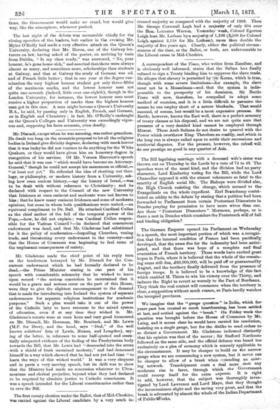We imagine that the " gauge question " in India,
which for years past has created so much heartburning, has been settled at last, and settled against the "break." On Friday week the question was brought before the House of Commons by. Mr. Laing, and it seems clear- he would-have carried his resolution, insisting on a single gauge, but' for the dislike to send orders- to so distant a Government. Mr. Gladstone indicated distinctly that his opinion was that of the mover ; Sir Stafford Northcote- followed on the same aide, and the official defence was based too exclusively on a plea of economy which is scarcely applicable to the circumstances. It may be cheaper to build on the narrow- gauge when we are commencing a new system, but it never, can be cheaper to allow of a break when wrxtendinff an w- ing network. Transhipment costs a deal more *ken any moderate rise in fares, through which as Government could recoup itself for the extra expense. It is right to add, however, that the subject was thoroughly inves- tigated by Lord Lawrence and Lord Mayo, that they thought the inconvenience slight and the saving very great, and that the break is advocated by almost the whole of the Indian Department of Publie4Vorks.






































 Previous page
Previous page